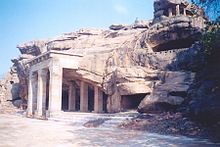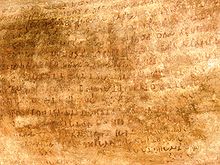Inscription Hathigumpha
- Inscription Hathigumpha
-

Inscription Hathigumpha.
Photographie provenant des collections de l’
Archaeological Survey of India,
prise par William Henry Cornish aux alentours de 1892.

Hathigumpha,
sur les collines de Udayagiri,
Bhubaneswar.

Inscription Hathigumpha du roi Khāravela sur les collines de Udayagiri.
L'inscription Hathigumpha (la « grotte de l'éléphant ») de Udayagiri, près de Bhubaneshwar, dans l'Orissa, fut gravée sur les ordres de Kharavela, le souverain de l'empira Kalinga, en Inde, au IIe siècle av. J.‑C.. L'inscription Hathigumpha se compose de dix-sept lignes profondément gravées en caractères Brahmi sur le surplomb d'une caverne naturelle appelée Hathigumpha sur le flanc sud des collines de Udayagiri près de Bhubaneshwar. Elle fait directement face à la roche des Édits d'Asoka à Dhauli, située à une distance d'environ 10 kilomètres.
L'inscription est gravée en utilisant ce que l'on considère comme une des formes les plus archaïques de l'alphabet Brahmi kalinga, ce qui suggère également une datation aux environs de 150 av. J.-C.[1].
Annexes
Notes
Références
Bibliographie
Articles connexes
Liens externes
Wikimedia Foundation.
2010.
Contenu soumis à la licence CC-BY-SA. Source : Article Inscription Hathigumpha de Wikipédia en français (auteurs)
Regardez d'autres dictionnaires:
Hathigumpha inscription — The Hathigumpha inscription( Elephant Cave inscription), from Udayagiri, near Bhubaneshwar in Orissa, was written by Kharavela, the king of Kalinga in India, during the 2nd century BCE. Hathigumpha inscription consists of seventeen lines incised… … Wikipedia
Kharavela — Étendue maximum de l empire kalinga que s était taillé Kharavela en Inde, au IIe siècle av. J.‑C.. Kharavela (ଖାରବେଳ) fut le souverain d un immense empire de l est et du sud de l Inde. Il est connu par une inscription dans la grotte de… … Wikipédia en Français
Khāravela — Kharavela Étendue maximum de l empire kalinga que s était taillé Kharavela en Inde, au IIe siècle av. J. C.. Kharavela (ଖାରବେଳ) fut le souverain d un immense empire de l est et du sud de l Inde. Il est connu par une inscription dans la… … Wikipédia en Français
Kharavela — Maximum extent of Kharavela (ଖାରବେଳ) Kalingan Empire: 2nd century B.C.EKharavela (ଖାରେବଳ) (IAST: Khāravela, Devanagari: खारवेल, Oriya: ଖାରେବଳ) (?209 – after 170 BCE) was the greatest Oriya emperor of Kalinga, the ancient name of Orissa state of… … Wikipedia
Udayagiri and Khandagiri Caves — are the caves of archaeological, historical and religious importance near the city of Bhubaneswar in Orissa, India. The caves are situated on two hills Udayagiri and Khandagiri, mentioned as Kumari Parvat in Hathigumpha inscription and face each… … Wikipedia
Early Indian epigraphy — The earliest traces of epigraphy in South Asia are found in Sri Lanka, dating to ca. the 6th century BC (Tamil Brahmi). Inscriptions in the Brahmi script also appear on the Indian subcontinent proper, from about the 3rd century BC (Ashoka… … Wikipedia
Indo-Greek Kingdom — Infobox Former Country native name = conventional long name = Indo Greek Kingdom common name = Indo Greek Kingdom continent = Asia region = country = era = Antiquity status = event start = year start = 180 BC date start = event1 = date event1 =… … Wikipedia
History of Tamil Nadu — A temple from the Chola period. The Cholas united most of the south Indian peninsula under a single administration during the tenth and the eleventh century CE. Part of a series on Histo … Wikipedia
Minor Inscriptions of Kharavela — Extent of Kharavela (ଖାରବେଳ) Kalingan Empire: 2nd century B.C.E[citation needed] … Wikipedia
Middle kingdoms of India — History of South Asia and India Stone age (7000–1300 BCE) … Wikipedia



